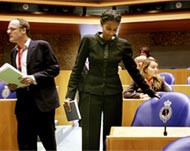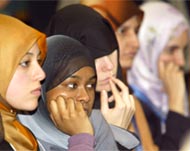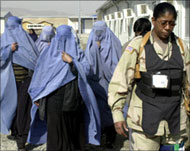Dismay at possible Dutch burqa ban
The Dutch government is set to make a final decision on whether to ban Muslim women from wearing the burqa and niqab.

The burqa, worn traditionally in some Muslim countries, covers the body and, at times, the face, while the niqab covers the face except the eyes.
These garments are now the focus of Dutch politicians who argue that it is a security threat.
Most Muslim women cover their bodies in public, except their hands and face, as an act of modesty and in accordance with teachings from the Quran. Some women also cover all or part of their faces.
But last December, the Dutch parliament voted to forbid women to wear the burqa and niqab, worn by very few Muslims in the Netherlands.
EU rights laws
The cabinet is now awaiting the results of a study into the legality of such a ban under European human rights laws before making its final decision and drawing up a bill.
 |
|
The Dutch cabinet is awaiting a |
The results are expected in the second half of this month.
Geert Wilders, the right-wing member of parliament who first proposed the ban, said at the time: “The burqa is hostile to women and medieval.
“For a woman to walk around on the streets completely covered is an insult to everyone who believes in equal rights.”
The Dutch may have been among the first to legalise cannabis, prostitution and euthanasia, earning them a reputation for tolerance, but they are now in the process of imposing some of Europe’s toughest entry and integration laws.
Fears of hijab ban
Famile Arslan, a Dutch Muslim lawyer, believes that a ban will reinforce today’s polarised climate, and prompt more women to cover their face in protest.
 |
|
Muslim women fear the UK may |
“We are very scared that what starts with a ban on the burqa will end with a ban on the hijab [headscarf],” she said.
“A country once known for its tolerance is now becoming known for its ignorance.”
The Islamic Human Rights Commission (IHRC), based in London, says such fears are legitimate.
Arzu Merali, head of research at the IHRC, said: “Clearly these are the fears of Muslim women, even in the UK.”
The IHRC recently conducted a two-year study into the feelings of Muslim women about hijab.
“Time and again, women were saying that ‘we prefer living here, we feel safe. However, we fear the UK might go down the route of France.”
First outright ban
The Netherlands would be the first European state to impose a countrywide ban on face coverings, though other countries have already outlawed them in specific places.
In 2004, France banned overt religious symbols such as Muslim headscarves, large Christian crosses and Jewish skullcaps from schools, arguing that they were contrary to its separation of church and state.
 |
|
Theo Van Gogh’s killing |
In the same year, the Belgian town of Maaseik banned the burqa by adapting existing laws which require people to be readily identifiable in public.
Social and religious tensions in the Netherlands have increased recently, exacerbated by the murder of Theo van Gogh, the columnist and film director, by a Dutch-Moroccan man in 2004 after he made a film accusing Islam of condoning violence against women.
His murder, and that of Pim Fortuyn, a politician opposed to immigration, two years earlier, unsettled the country and provoked an anti-Muslim backlash, as well as much soul-searching about the make-up and cohesion of Dutch society.
About a third of the country’s Muslims have Moroccan ancestry, while Dutch Turks form another sizeable community.
Offensive
One Dutch-born Muslim, who gave her name only as Hope, said she will wear a surgical mask to dress in accordance with her religious beliefs should the ban go ahead.
Hope, 22, said Wilders and his supporters do not understand and their comments upset and offend her.
 |
|
The burqa is worn traditionally in |
“Yes, extremism is growing, but I am not the problem,” she said.
One of about 50 women in the Netherlands who wear the niqab, Hope said she spent a lot of time persuading her parents that she had not been brainwashed or developed “militant tendencies”, it was to show her love of God.
“I got attached to the niqab like to a pair of jeans,” she said.
She said she will “wear one of those things they wore during the Sars epidemic if I have to”.
Hope is among a number of Amsterdam’s young Muslim women who took part in an exhibition in the city about women’s motivations for wearing hijab, as well as the different styles and colours they favour.
Anti-women
Few of the contributors would wear a niqab, with some even agreeing that it sends the message that a woman wants to withdraw from society, but they object to the ban.
“There is a fear of there being a template of women’s liberation being forced on everyone … If we were able to step back from what is becoming a fight between the West and the rest, we will find that most moves are anti-women, not just anti-Muslim” Arzu Merali |
Kauthar Yakubi, 16, said: “I think the niqab and the burqa are a little bit extreme and I can understand why people want to see a woman’s face.”
But Yakubi, who chooses headscarves ranging from bright pink to black depending on her mood, said: “I don’t think there should be laws governing how a person dresses – it is their choice.”
Merali said those in power should talk to all the minorities in the Netherlands and ask them what their concerns are.
“There is a fear of there being a template of women’s liberation being forced on everyone,” she said. “It has to be all women expressing their fears as well as what will improve their lives.
“If we were able to step back from what is becoming a fight between the West and the rest, we will find that most moves are anti-women, not just anti-Muslim, because it denies women the right to freedom of expression.”